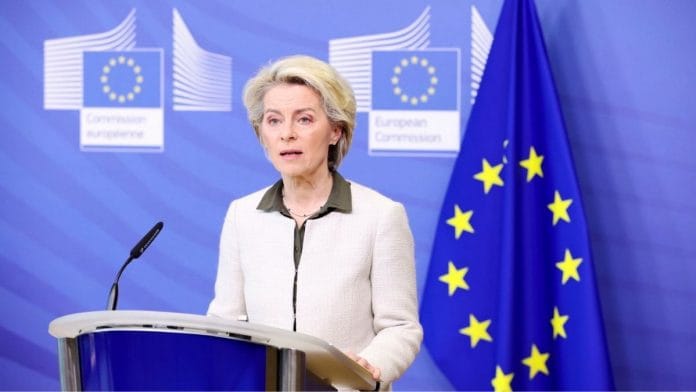New Delhi: Nearly 300 million voters from 27 European Union (EU) member states will vote to elect the Members of European Parliament (MEPs) early next month. The elections, scheduled from 6-9 June, are the first since Brexit — when the UK formally exited the EU — and the start of the war in Ukraine.
Historically known for a low voter turnout, the election this time will see 720 MEPs assume office and a possible emergence of the far-right amid higher inflation, energy crisis, cyber espionage cases and negotiations around the accession of Ukraine and Bosnia as new EU members.
The voter turnout in the European Parliament elections has reduced from 62 percent in 1979 to 43-50 percent in the last several elections. In 2019, the turnout was the highest in two decades but still a low 50.66 percent.
Voter turnout is a challenge in EU elections, so much so that European Commission Vice President Margaritis Schinas, earlier this year, invited Taylor Swift to promote voting among the youth.
One of the three core institutions of the EU, the European Parliament is the only directly elected institution charged with representing public interests. Its inception goes back to 1951 when six countries — France, Germany, Netherlands, Belgium, Luxembourg and Italy — came together to set up the Common Assembly of the European Coal and Steel Community, which later became the European Parliament, whose members, since 1979, have been directly elected.
The European Parliament shares legislative and budgetary functions with the Council of the European Union and has supervising powers in the functioning of all EU institutions and bodies. The European Parliament is also responsible for ratifying international treaties, while all EU member states possess equal veto privilege in treaty negotiations.
While there are no parties per se in the European Parliament elections, elected MEPs can choose to join groups based on their affiliations. Larger transnational groups include the European People’s Party Group (center-right), Progressive Alliance of Socialists and Democrats (center-left), Renew Europe (liberal), Greens-European Free Alliance (left), European Conservatives and Reformists Group (right), Identity and Democracy Group (far-right), and The Left in the European Parliament–GUE/NGL (left).
It is the norm that the group with a majority elects the President of the European Commission. Ursula von der Leyen, the current President, is running for a second term in office.
Also read: The many possible outcomes of Indian elections & a band of aging activists championing peace
Conduct of elections & why it’s important
Elections happen every five years, with residents of the 27 member states voting. The share of the MEPs is based on the populations of member states, with the highest number of MEPs, at least 96, voted in from Germany, while smaller countries such as Luxembourg, Cyprus, and Malta send six MEPs each.
While member states have discretion over the voting process, i.e., there is no consistency in the process, EU residents can vote in whichever member state they are residents of.
The European Union, and thus, the European Parliament, acts as a supranational regional bloc, commanding European and Western European policies on migration, trade, climate response, and foreign affairs. However, the most salient feature of this bloc is the ‘single market’ it has turned Europe into.
The EU and its member countries are the world’s largest donors of humanitarian aid. Furthermore, the EU aims to “fight for democracy, freedom of speech and fair elections across the globe.”
The EU’s move towards Common Security and Defence Policy (CSDP) aims to strengthen international security and defence in “third countries” via contributions — civilian, police and military — to member states for crisis prevention, management and peacebuilding.
The EU’s Neighbourhood Policy (ENP), which aims to govern relations of the EU with sixteen countries in the south and east of the bloc’s boundaries, is another example of the collective response to issues in the neighbourhood.
Also read: West’s ‘balancing act’ on India, diaspora divided over BJP mobilisation — global press
Emergence of far-Right, cyber espionage & misinformation
The 2024 European Parliament elections are noteworthy due to predictions over the emergence of the far-Right.
According to research by the European Council on Foreign Relations, right-wing populists are likely to top the polls in nine member states — Austria, Belgium, the Czech Republic, France, Hungary, Italy, the Netherlands, Poland, and Slovakia — and come second or third in a further nine countries — Bulgaria, Estonia, Finland, Germany, Latvia, Portugal, Romania, Spain, and Sweden.
Currently, the centre-Right European People’s Party Group is in the majority in the European Parliament and part of a ‘super grand coalition’ with centre-Left groups — Progressive Alliance of Socialists and Democrats and Renew Europe.
Right-wing parties such as European Conservatives and Reformists (ECR) and Identity and Democracy (ID) this election are projected to gain seats and enter into a coalition to influence decision-making in the EU. Right-wing populist Hungarian PM Victor Orban has already announced that members of his Fidesz party will join Italian PM Meloni’s ECR in the elections. The far-Right is generally known to be Euro-sceptic and ethno-nationalist.
Members of these groups are gaining prominence in the domestic politics of the member states.
Weeks before the elections, cases of cyber espionage started erupting in Europe, with accusations levelled at China and Russia for allegedly deploying spies to undermine the democratic process in Europe.
In Germany, an assistant of Maximilian Krah, a candidate in the European elections and AfD party member, was arrested on accusations of espionage. Sweden, too, expelled a journalist of Chinese descent on the claims of national security concerns.
The EU has also ordered an investigation into Meta amid concerns over disinformation, a lack of due diligence, and the role of foreign actors such as Russia, China, and Iran on its platforms.
(Edited by Madhurita Goswami)
Also read: Has Modi wave peaked? And jury still out on BJP’s Pasmanda outreach — global media reports






